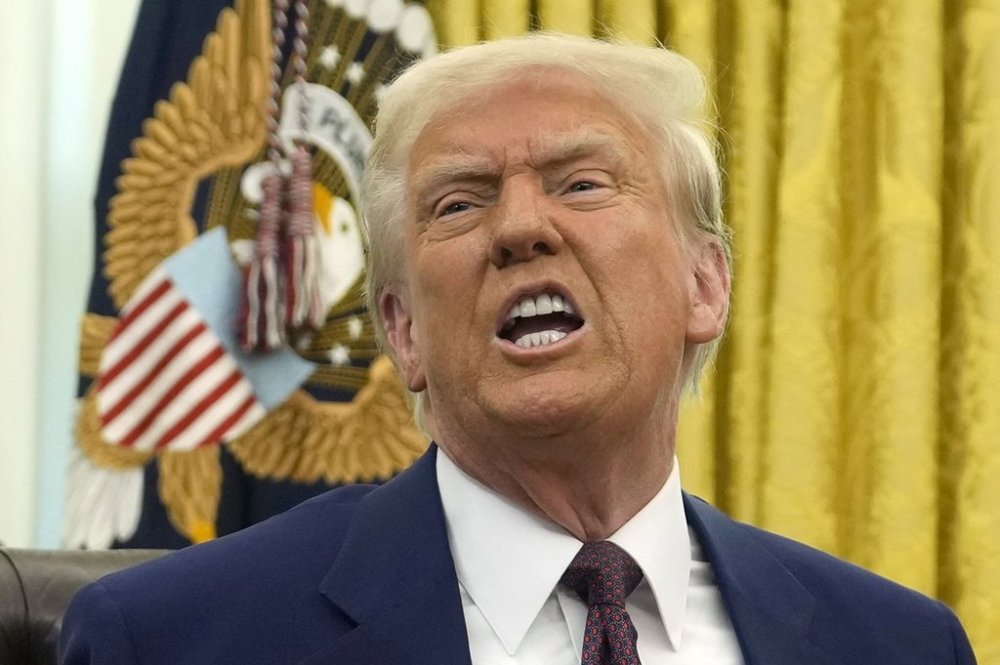Canada still top of mind for Trump, ‘not a good place to be’
Advertisement
Read this article for free:
or
Already have an account? Log in here »
To continue reading, please subscribe:
Monthly Digital Subscription
$0 for the first 4 weeks*
- Enjoy unlimited reading on winnipegfreepress.com
- Read the E-Edition, our digital replica newspaper
- Access News Break, our award-winning app
- Play interactive puzzles
*No charge for 4 weeks then price increases to the regular rate of $19.00 plus GST every four weeks. Offer available to new and qualified returning subscribers only. Cancel any time.
Monthly Digital Subscription
$4.75/week*
- Enjoy unlimited reading on winnipegfreepress.com
- Read the E-Edition, our digital replica newspaper
- Access News Break, our award-winning app
- Play interactive puzzles
*Billed as $19 plus GST every four weeks. Cancel any time.
To continue reading, please subscribe:
Add Free Press access to your Brandon Sun subscription for only an additional
$1 for the first 4 weeks*
*Your next subscription payment will increase by $1.00 and you will be charged $16.99 plus GST for four weeks. After four weeks, your payment will increase to $23.99 plus GST every four weeks.
Read unlimited articles for free today:
or
Already have an account? Log in here »
Hey there, time traveller!
This article was published 13/02/2025 (300 days ago), so information in it may no longer be current.
OTTAWA – As President Donald Trump signed an executive order for reciprocal tariffs on Thursday that escalates his trade threats, his administration took aim at Canada’s digital services tax as a major trade irritant.
The White House sent out a document calling digital taxes in both Canada and France “unfair” for taxing American companies.
Speaking in the Oval Office Thursday afternoon, Trump slammed Canada on trade and singled out its low defence spending, saying the country is a “very serious contender to be our 51st state.”

“Canada’s been very bad for us on trade but now Canada’s going to have to start paying up,” he said. “Canada’s going to be a very interesting situation because we just don’t need their product.”
As Trump took more swings at the Canadian economy, businesses watched with unease.
“The press conference struck me because Canada is clearly still top of mind for him and that’s not a good place to be,” said Matthew Holmes, an executive vice president at the Canadian Chamber of Commerce.
“We still have the sword of Damocles hanging over us and we need to be ever ready for what comes next.”
He said the constant threats, the changing deadlines and the moving of goalposts is profoundly undermining business certainty in Canada — from major capital-investment decisions all the way down to individual shipping orders.
Holmes believes the reciprocal tariff order is largely aimed at other markets — places like Europe, South Korea, Japan and India. But the details are few, and the bigger picture is alarming.
“The broader signal it sends is an escalation, a broad proliferation of tariffs … widening the likelihood of a trade war that’s broad, hitting multiple economies,” Holmes said.
The Chamber is also among a spate of business groups that have long warned the Trudeau government that its three per cent digital services tax, which came into effect over the summer, would become a major thorn in the side of the U.S.
The controversial policy has stirred the ire of U.S.-based lobby groups, as it requires large tech businesses to pay tax on revenues earned through engaging online users in Canada.
The Business Council of Canada’s CEO Goldy Hyder said the tax “continued to be an issue” raised in meetings he had in Washington this week with senior U.S. officials, congressmen and business leaders.
“It is viewed by Americans as an irritant that violates the USMCA in the same way that Canadians believe tariffs violate the agreement,” he said in an emailed statement.
The Trudeau government’s last budget estimated the tax, which is retroactive for the first few years, should bolster Ottawa’s coffers by some $5.9 billion over five years.
A White House fact sheet described it as unfair, saying Canada and France “use these taxes to each collect over $500 million per year from American companies.”
Trump’s latest executive order says the U.S. will counter against a sweeping range of trade irritants, including subsidies and “burdensome regulatory requirements.”
It also singles out a suite of non-tariff trade barriers, ranging from human and animal health trade requirements to government procurement policies, intellectual property protection and digital trade barriers.
“This could be a massive overhaul of how tariffs are set,” said William Pellerin, an international trade lawyer at McMillan.
He explains that countries set their tariff rates under trade agreements, and generally must set the same tariff levels for all countries — abiding by something called the “Most Favoured Nation” principle. That is, unless countries enter into further trade agreements to further lower rates.
But this move would upend those norms, allowing them to be adjusted on a case-by-case basis.
The move raises all kinds of questions about how it would work — not to mention how quickly all this could be implemented.
Putting Trump’s order into force will launch the U.S. government into a complex process that Pellerin said will likely take months to sort out — at the soonest.
This report by The Canadian Press was first published Feb. 13, 2025.










